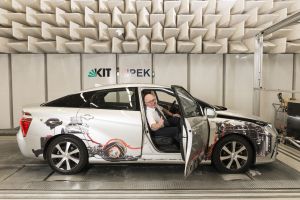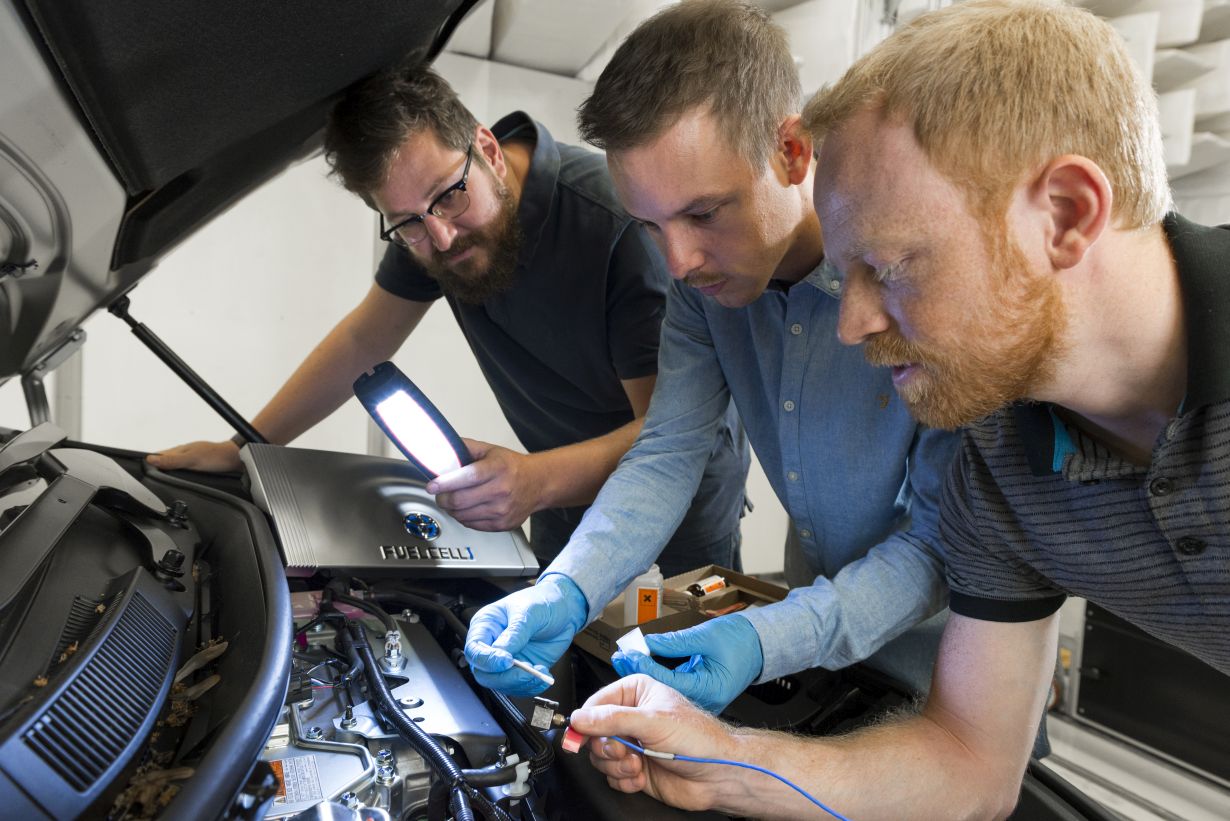Germany and China intensify collaboration on the development of climate-friendly mobility technologies. Karlsruhe Institute of Technology (KIT) and Tongji University Shanghai will study standardizable methods for joint technology development at different locations. Within the MorEH2 project funded by the Federal Ministry of Education and Research (BMBF) and the Chinese government, engineers in Germany and China will simultaneously work on the validation of electrified drives in fuel cell vehicles.
Global production chains in industry are rather common. Automotive manufacturers produce vehicles from partial systems that are often prefabricated at several locations worldwide. Development work, however, usually takes place at one location. Traditionally, a vehicle is developed according to the conceptions of the manufacturer and the specific needs and regulatory requirements of the target markets. “This an anachronism in our globalized world,” says Professor Albert Albers, Head of IPEK, KIT’s Institute of Product Engineering. “The CO2 problem, for instance, affects all of us and we have to find global solutions that can be adapted regionally. Our research is therefore aimed at enhancing flexibility and international exchange already in the development phase.” To reach this objective, IPEK, in cooperation with the Clean Energy Automotive Engineering Center (CEAEC) of Tongji University Shanghai, China, will now develop validation methods and environments that also work over longer distances.

Within the MorEH2 (methods for distributed development of H2 fuel cell vehicles in cooperation with China) research project funded by the Federal Ministry of Education and Research (BMBF) and the Chinese government, both universities will study electric drives of fuel cell vehicles. The validation process will take place at both locations. Spatial separation of the developers requires use of latest technologies and rapid data connections. “The whereabouts of engineers in our joint team and the location of specific components are no longer relevant,” says Dr. Matthias Behrendt, who coordinates the project on the German side. “A test vehicle may be located on our roller dynamometer at KIT, while the driver is in China.” Work will be based on the IPEK-XiL (X-in-the-loop) approach for validating mechatronic systems that was developed by IPEK and has already been established at the KIT Mobility Systems Center. Contrary to traditional validation methods, virtual and physical tests are combined. This means that a fuel cell may be located physically in a lab of KIT, but is integrated virtually into a test drive in Shanghai.
The biggest challenge associated with a joint validation process, however, is not physical distance between the team members and systems, Albert Albers says. “We have to remind ourselves of what validation of technical systems actually means. The question is not whether the technology was developed correctly. We rather want to know whether we have developed the right technologies for the people who are using them.” China and Germany are very differently structured target markets, with the requirements on the vehicles varying accordingly. “Whoever has driven a car in Shanghai, knows that car traffic there is quite different from ours.” This influences the design of assistance systems, such as parking aids, distance controllers or automated driving. Hence, the possibility of an independent and, if necessary, different development of partial systems will be an important element of standardized methods for the spatially distributed validation of vehicles.
With the research project, Germany and China want to support further development of eco-friendly mobility. KIT and Tongji University Shanghai already are strategic partners, with collaboration covering many areas, such as academic education. Since 2007, Professor Albert Albers has been guest professor there. Tongji University Shanghai also is an important center of fuel cell research in China. The German-Chinese research project is to contribute to initiating standardization activities in this area.
More about the KIT Mobility Systems Center http://www.kit.edu/research/6720.php
Being “The University in the Helmholtz Association”, KIT creates and imparts knowledge for the society and the environment. It is the objective to make significant contributions to the global challenges in the fields of energy, mobility, and information. For this, about 10,000 employees cooperate in a broad range of disciplines in natural sciences, engineering sciences, economics, and the humanities and social sciences. KIT prepares its 22,800 students for responsible tasks in society, industry, and science by offering research-based study programs. Innovation efforts at KIT build a bridge between important scientific findings and their application for the benefit of society, economic prosperity, and the preservation of our natural basis of life. KIT is one of the German universities of excellence.

